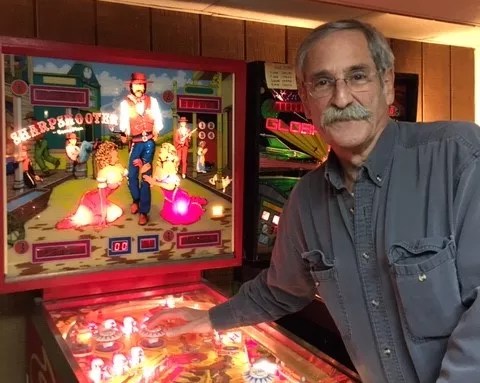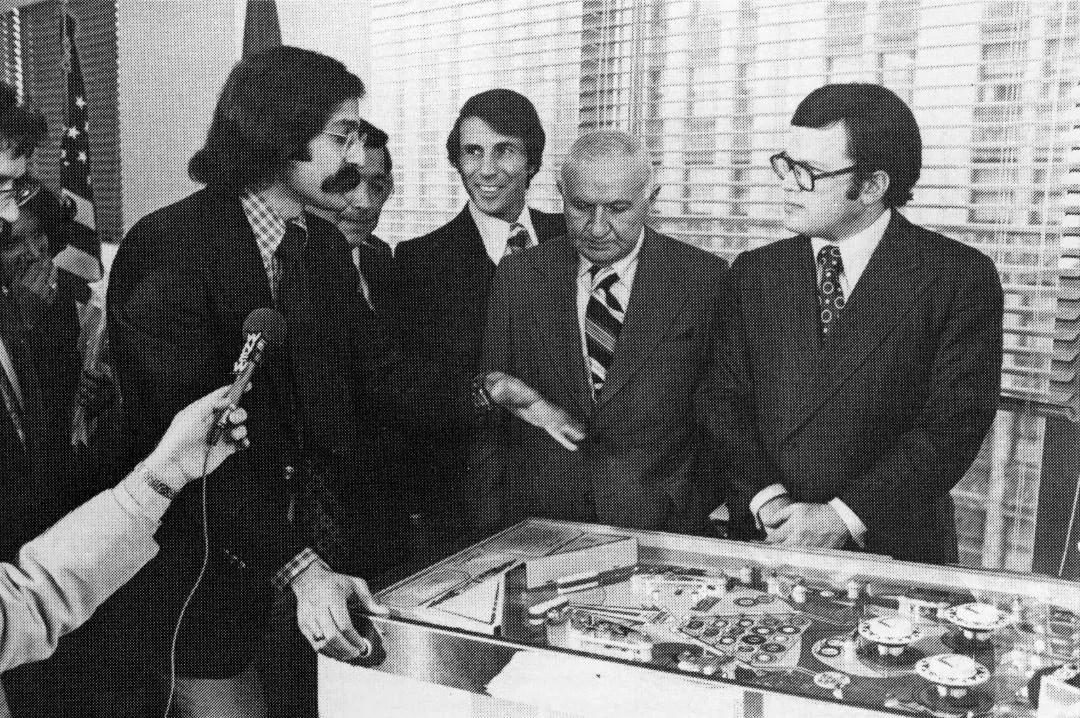
Courtesy of Roger Sharpe

Audio By Carbonatix
Pinball has been going through an amazing renaissance, even in a time when people can play video games in virtual environments on run-of-the-mill PCs in the comfort of their homes.
The arcade staple has seen an explosion in manufacturing and demand in the last 12 years. At one time, every new pinball machine in the country came from just one remaining maker, Stern Pinball, but now there are thousands of machines made by outfits such as Jersey Jack Pinball, Spooky Pinball and American Pinball that attract big-time licenses for games from Marvel Comics, Mattel’s Hot Wheels and even The Beatles.
The pinball machine predates the video game industry by decades, but there was a time when pinball machines were harder to find in the U.S. than an arcade in a modern shopping mall.
New York City Mayor Fiorello LaGuardia initiated a ban on pinball games in 1942 as a way to crack down on mob activity. LaGuardia saw the machines as a gateway “craze” to gambling and ordered their seizure to keep the city’s streets free from “slimy crews of tinhorns, well dressed and living in luxury on penny thievery,” according to the nonprofit Pacific Pinball Museum.
Writer and pinball historian Roger Sharpe, who will be at the annual Texas Pinball Festival in Frisco, March 24-26, grew up in the pinball industry mecca of Chicago, but he didn’t think he had the chops to play the game until he went to college in Wisconsin. His obsession with the game fueled his drive to report on and overturn the ban in 1976 by playing a perfect game in a court proceeding. His story has been chronicled in a new film that opened on Friday called Pinball: The Man Who Changed the Game.
“I watched a fraternity brother, and this is in Madison, Wisconsin, with the game Cowpoke at a burger place,” Sharpe tells the Observer. “He was having a hamburger, french fries, a Coca-Cola and a cigarette. I was standing behind him at a counter watching him eat his lunch while he played the game as he was cradling the ball.”
“Cradling” refers to a tactic in which a player holds a pinball in place by holding it in a turned-up flipper to help aim their shot. Sharpe says his frat buddy had to go to class and offered him a chance to continue his game. From then on, he was hooked.

Roger Sharpe, left, showed the New York City Council in 1976 how he could call his shots in a game of pinball, proving that the machines can’t be used for gambling because they are games of skill instead of chance.
Courtesy of Roger Sharpe
“I never knew there was skill involved,” Sharpe says. “I realized I could gain some level of control as a person. I could actually enjoy the act of playing pinball machines, of just being this insipid person who was just overwhelmed by it all.”
Sharpe moved to New York City in the early ’70s to pursue his career with GQ magazine, where his love of pinball continued until he learned of its 30-plus-year prohibition. He’d either have to drive to New Jersey or visit an adult book store just to play the game until, of course, the city learned the place had a machine.
He started writing a series of articles and features for the magazine exploring the ban, mainly so he could have an excuse to get a machine he could put in his apartment. Then in 1976, the American Association of New York started lobbying to overturn the ban and asked Sharpe if he would play a game in front of the City Council to demonstrate that pinball is a game of skill, not chance.
“I was being incredibly selfish and wanted my own game,” Sharpe says with a laugh. “When I started doing research for an article, I was dumbfounded because when I went to the public library, there were no books on the subject. I was beside myself. How am I going to now approach this subject? I made a comment to the editor that it’s going to take a little more time to pull this idea together and they said, ‘Why don’t you write a book?'”
The following year, Sharpe wrote and published Pinball!, a comprehensive guide to the game’s history, mechanics, techniques and challenges. Sharpe says the game may just look like a random duel with gravity, but new and old machines have multilevel challenges that require sharp nerves, hand-eye coordination and careful planning and strategy.
“The skills and techniques have been improved in the same way there’s been improvements in tennis,” Sharpe says. “If you go down the list of every particular type of sports activity, even video games, look at what types of controllers and keyboards are used. All of that is tuned to whatever necessarily appeals to their specific base and expanded base of players. With pinball if you go back in time as I do, it’s easy to say just go for the flashing lights. Which lights? Part of that challenge is the challenge of discovery.”
Sharpe’s legendary story of pinball’s redemption is well known and retold among pinball players and collectors, but it’s about to get an even wider audience thanks to a new movie directed by siblings Austin and Meredith Bragg. Pinball: The Man Who Saved the Game tells Sharpe’s story through two actors. including West Side Story’s Mike Faist, who plays the young Sharpe, and Better Call Saul’s Dennis Boutsikaris, who plays the modern-day version behind Sharpe’s bushy, eye-catching mustache.
“Basically they said, ‘Has anyone ever done a movie about you?'” Sharpe says of the filmmakers. “I said, ‘Yeah, I’ve been in a number of documentaries and give talks, and they said, ‘No, no. Has anyone ever done a movie about you?”
The film chronicles Sharpe’s story of persuading America’s most bureaucratic state government to overturn a 30-year law steeped in misguided claims. But Sharpe says it also shows how something as simple as a game of pinball can shape a person’s life, loves and legacy.
“It’s like an out-of-body experience,” Sharpe says. “It’s surreal, obviously, but it is very, very strange in a Twilight Zone episode type of way to be given either the gift or curse of reliving your life. In some ways, it’s like Groundhog Day in some shape or form as I resurrect the path and told my story to Meredith and Austin. It was cathartic, to say the least. I’m still dumbfounded by the level of interest. I am an artifact. I am a historical footnote, and the fact that I’ve stayed relevant all these years is astounding to me.”